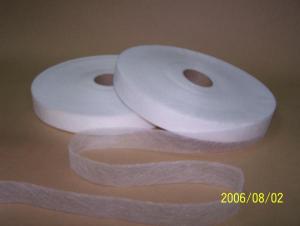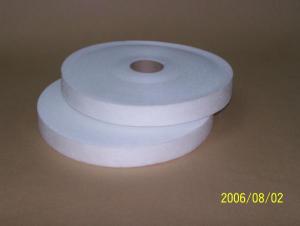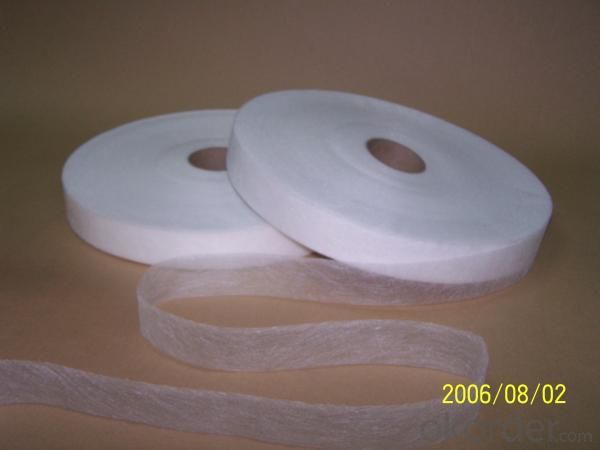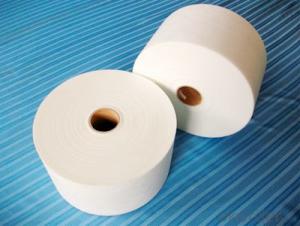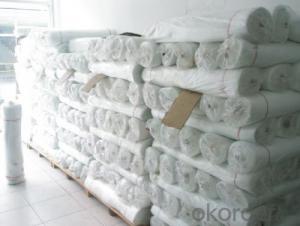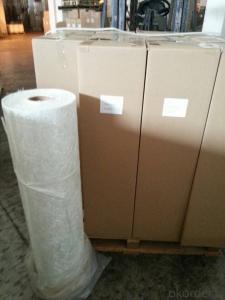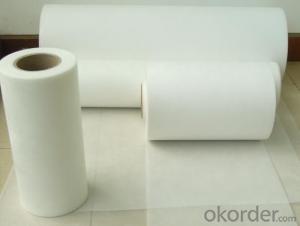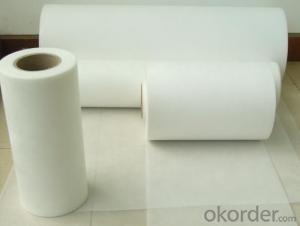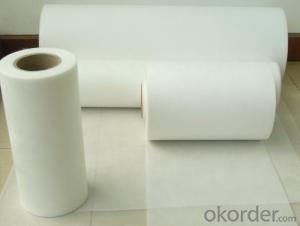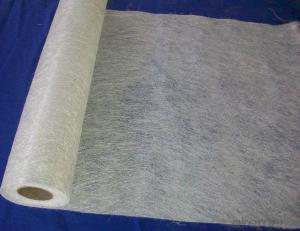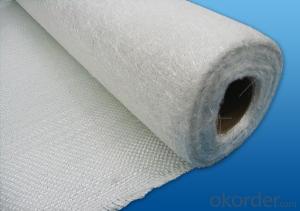Fiberglass Mat Tissue e-Glass Fiber Tissue Mat
- Loading Port:
- China Main Port
- Payment Terms:
- TT or LC
- Min Order Qty:
- 5000 Square Meter m²
- Supply Capability:
- 7000000 Square Meter m²/month
OKorder Service Pledge
OKorder Financial Service
You Might Also Like
Introduction of E-glass Fiber Tissue Mat
Fiberglass tissue Mat is mainly used for the surface layers of FRP products. It has good capability like fiber dispersion, smooth surface, low binder content, fast resin impregnation and good mould obedience. It is capable of significantly improving the strength of FRP surface layer, strong impaction resistance, excellent uniformity of surface, good covering up the texture of under layers and good corrosion resistance.
specification of E-glass Fiber Tissue Mat
Size: 20g/, 30g/, 35g/, etc.
Width: 50mm, 75mm, 100mm, 1000mm, etc.
Length: 400m, 500m, 1000m, etc.
All set of production lines are introduced from Germany.
Packaging & Delivery of E-glass Fiber Tissue Mat
Packaging Detail: carton & pallet
Delivery Detail: Within 15 days after confirm order
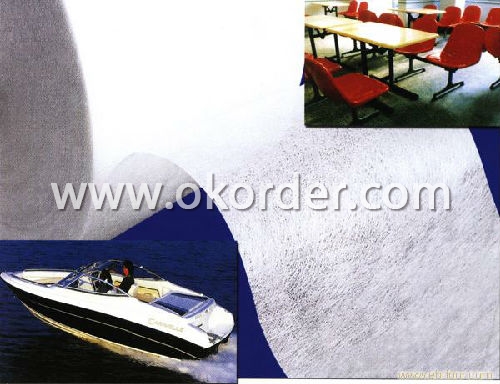
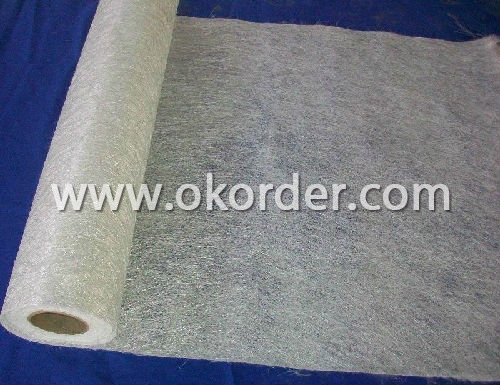
- Q: Does fiberglass mat tissue require any special curing conditions?
- Yes, fiberglass mat tissue does require special curing conditions. It typically needs to be cured at specific temperature and humidity levels for a specific duration of time in order to achieve optimal strength and performance.
- Q: Is fiberglass mat tissue resistant to fading?
- In general, fiberglass mat tissue tends to lack resistance against fading. Fading refers to the loss of original color or brightness in a material caused by exposure to sunlight or other environmental factors. Although fiberglass itself is known for its durability and ability to withstand weathering, the mat tissue used in fiberglass products often succumbs to fading over time. This can be attributed to both the binder or resin used to bind the fiberglass fibers together and the pigments or dyes used to color the tissue. When exposed to UV rays and other outdoor elements, these components can deteriorate and fade, resulting in a decrease in color intensity or brightness. Therefore, if maintaining the visual appeal of a fiberglass product is important, it may be necessary to take additional protective measures, such as applying a UV-resistant coating or using pigments specifically formulated for outdoor use.
- Q: Is fiberglass mat tissue resistant to UV degradation?
- The level of UV resistance in fiberglass mat tissue may vary depending on the specific type and quality. Generally, it is resistant to UV degradation to some extent. UV degradation occurs when materials are exposed to prolonged UV radiation from the sun, causing discoloration, brittleness, and reduced strength. Manufacturers often add additives and coatings to fiberglass mat tissue to provide some level of UV resistance. These additives and coatings protect the fibers from the harmful effects of UV radiation. However, it is important to note that the level of UV resistance can differ between manufacturers and products. To ensure the highest level of UV resistance, it is recommended to select fiberglass mat tissue specifically designed for outdoor applications and tested for UV stability. Additionally, regular maintenance and inspections can help identify any signs of UV degradation and allow for timely repairs or replacements if needed.
- Q: Is fiberglass mat tissue suitable for insulation in data centers?
- Insulation in data centers can be achieved using fiberglass mat tissue, which is commonly utilized for thermal and acoustic purposes. This type of fiberglass insulation has numerous benefits, including high thermal resistance, fire resistance, and sound absorption capabilities. Maintaining a controlled and stable environment for sensitive electronic equipment is crucial in data centers, and insulation plays a vital role in achieving this. Fiberglass mat tissue can effectively reduce heat transfer, prevent hot spots, and maintain the desired temperature levels within the data center. Additionally, it contributes to noise reduction, creating a comfortable working environment for personnel. However, before determining the suitability of fiberglass mat tissue for data center insulation, certain factors need to be considered. Thorough evaluation of the data center's specific requirements for thermal insulation, fire resistance, and acoustic control is necessary. The installation process and maintenance requirements should also be assessed to ensure effective implementation and upkeep of the insulation material. It is important to explore alternative insulation options, such as mineral wool, foam insulation, or specialized materials that may better meet the unique demands of data centers. These materials may offer advantages like enhanced fire resistance, moisture control, or improved thermal efficiency. Ultimately, determining the suitability of fiberglass mat tissue for data center insulation requires a comprehensive evaluation of specific needs, regulatory requirements, and available options. Seeking the expertise of professionals in data center construction and insulation can provide valuable insights and aid in making an informed decision.
- Q: Is fiberglass mat tissue suitable for agricultural applications?
- Certainly! Fiberglass mat tissue proves to be a suitable option for agricultural uses. Its versatility makes it an ideal material in the agricultural sector, providing numerous advantages. The resistance of fiberglass mat tissue to moisture, chemicals, and UV radiation makes it perfect for applications like greenhouse roofing, animal enclosures, and agricultural equipment. It possesses exceptional insulation properties, aiding in the regulation of temperature and safeguarding crops or livestock against harsh weather conditions. Moreover, fiberglass mat tissue is lightweight, easy to install, and long-lasting, making it an economical choice for agricultural projects. In conclusion, fiberglass mat tissue is a fitting material for a wide range of agricultural applications, ensuring durability, flexibility, and safeguarding for the farming industry.
- Q: How does the surface finish of fiberglass mat tissue affect its adhesion to resin?
- The surface finish of fiberglass mat tissue can significantly affect its adhesion to resin. The surface finish refers to the texture or smoothness of the fiberglass mat tissue. In general, a rougher surface finish tends to provide better adhesion to resin. This is because a rough surface provides more surface area for the resin to adhere to, allowing for a stronger bond. Rougher surface finishes can be achieved through various manufacturing techniques, such as using coarser fibers or adding texturizing agents during production. On the other hand, a smoother surface finish may result in weaker adhesion. A smooth surface does not provide as much surface area for the resin to bond with, leading to a weaker and less durable bond. Smoother surface finishes can be achieved by using finer fibers or through additional processing steps to smooth out the surface. It is important to consider the specific application and requirements when choosing the surface finish of fiberglass mat tissue. For applications that require high strength and durability, a rougher surface finish may be preferred to ensure optimal adhesion to the resin. Conversely, for applications where a weaker bond is acceptable or where a smoother surface finish is desired for aesthetic reasons, a smoother surface finish may be chosen. Ultimately, the surface finish of fiberglass mat tissue plays a critical role in determining the adhesion to resin. It is essential to select the appropriate surface finish to achieve the desired strength, durability, and performance in various applications.
- Q: Can fiberglass mat tissue be used for making insulation panels?
- Indeed, insulation panels can be manufactured using fiberglass mat tissue. This lightweight and flexible material possesses remarkable thermal insulation characteristics. Typically, it is utilized as a reinforcing layer during the production process of insulation panels. By doing so, the mat tissue not only fortifies the panels, but also ensures efficient insulation against heat transfer. Moreover, fiberglass mat tissue exhibits resistance against moisture, mold, and mildew, rendering it highly suitable for insulation purposes.
- Q: Can fiberglass mat tissue be recycled?
- Yes, fiberglass mat tissue can be recycled. It is a common practice to recycle fiberglass waste, including fiberglass mat tissue, by breaking it down into smaller fibers and using it as a raw material in various industries such as insulation, construction, and automotive. Recycling fiberglass helps to reduce waste and conserves resources.
- Q: Can fiberglass mat tissue be used for making lightweight doors?
- Yes, fiberglass mat tissue can be used for making lightweight doors. It is a lightweight material that offers excellent strength and durability, making it suitable for door construction. Additionally, fiberglass mat tissue can provide insulation properties and resistance to moisture, making it a viable option for lightweight door manufacturing.
- Q: What is the lifespan of fiberglass mat tissue?
- The longevity of fiberglass mat tissue can differ based on a range of elements, including material quality, exposure conditions, and maintenance level. Nevertheless, fiberglass mat tissue is generally recognized for its resilience and extended lifespan. By ensuring correct installation and consistent upkeep, fiberglass mat tissue can endure for numerous decades. Its resistance to corrosion, moisture, and UV radiation further contributes to its longevity. Furthermore, fiberglass mat tissue is frequently employed in roofing, insulation, and reinforcement applications, engineered to withstand challenging environments and deliver enduring effectiveness.
1. Manufacturer Overview
| Location | Hebei,China |
| Year Established | 2008 |
| Annual Output Value | Above US$20 Million |
| Main Markets | Mid East;Western Europe:South Asian |
| Company Certifications | ISO9001:2000;ISO14001:1996;GB/T28001:2001 |
2. Manufacturer Certificates
| a) Certification Name | |
| Range | |
| Reference | |
| Validity Period |
3. Manufacturer Capability
| a) Trade Capacity | |
| Nearest Port | Tianjin |
| Export Percentage | 80% |
| No.of Employees in Trade Department | 350 People |
| Language Spoken: | English;Chinese;Korean |
| b) Factory Information | |
| Factory Size: | Above 100,000 square meters |
| No. of Production Lines | Above 12 |
| Contract Manufacturing | OEM Service Offered;Design Service Offered |
| Product Price Range | Average |
Send your message to us
Fiberglass Mat Tissue e-Glass Fiber Tissue Mat
- Loading Port:
- China Main Port
- Payment Terms:
- TT or LC
- Min Order Qty:
- 5000 Square Meter m²
- Supply Capability:
- 7000000 Square Meter m²/month
OKorder Service Pledge
OKorder Financial Service
Similar products
Hot products
Hot Searches
Related keywords
